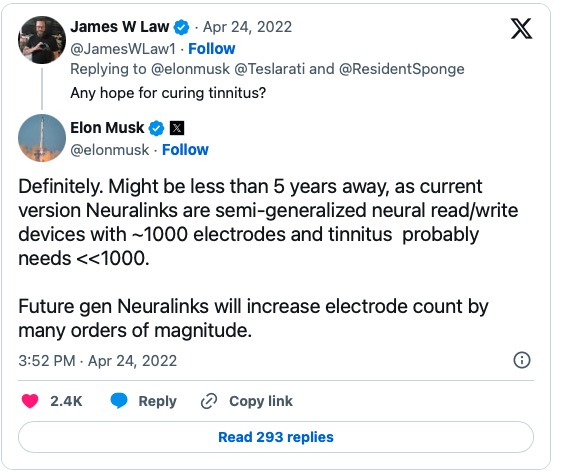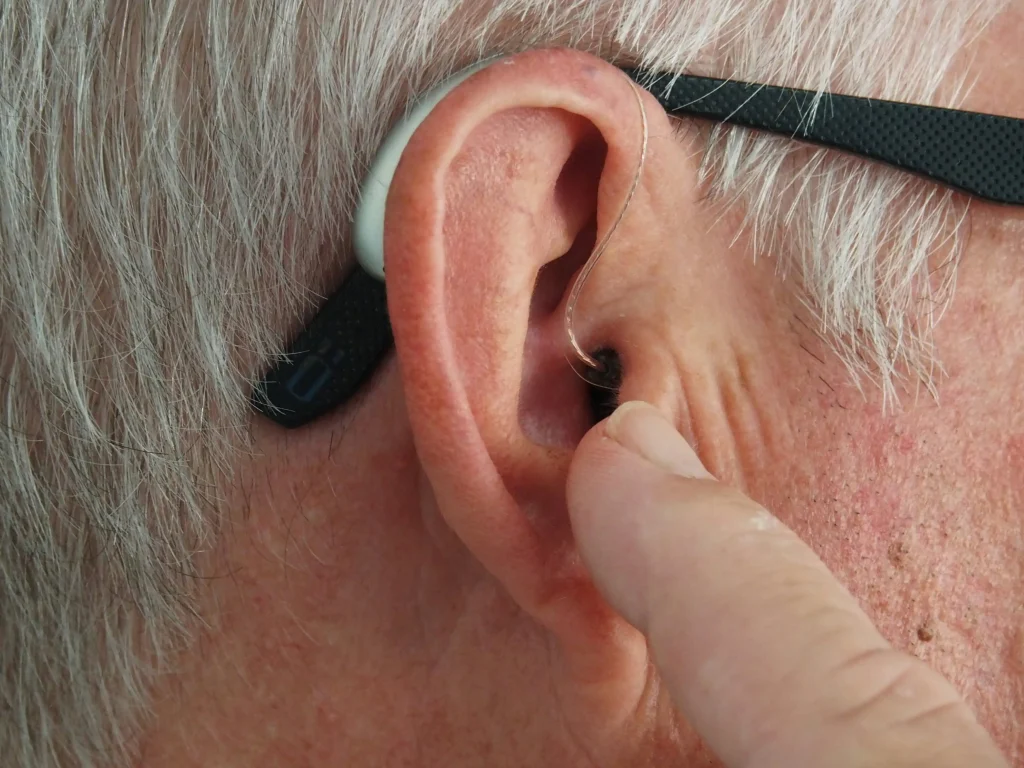Elon Musk has announced that his company Neuralink has created a chip that will help treat tinnitus within five years. The tycoon hopes that his technology will yield quick results, but experts warn that it is not worth expecting miracles in the near future. After all, the human brain is extremely complex and tinnitus has its origins in many dysfunctions of the human body, and research into its functioning still has much to discover.
Table of Contents:
- The human brain is the most complex biological structure – tinnitus and what Musk said
- What is Neuralink?
- Musk on tinnitus treatment
The human brain is the most complex biological structure – tinnitus and what Musk said
What did Musk say?
In his April 2022 tweet, he wrote: “Definitely. Might be less than 5 years away, as current version Neuralinks are semi-generalized neural read/write devices with ~1000 electrodes and tinnitus probably needs <<1000. Future gen Neuralinks will increase electrode count by many orders of magnitude.” – meaning: “Definitely. It may be less than 5 years, current versions have ~1000 electrodes and tinnitus probably requires far fewer. Future versions will have many more.”

Where does tinnitus come from? The latest research explains the causes
Tinnitus, also known as tinnitus, is a subjective sensation of sound without an external source. It can take the form of ringing, squeaking or buzzing and affects up to 15% of the population. Although the exact cause is still unclear, more and more studies are shedding light on potential mechanisms for this phenomenon.
The main causes of tinnitus:
- Hearing loss (especially age-related or noise exposure)
- Neuroplasticity – changes in the brain after hearing damage
- Overactivity of neurons in the auditory cortex
- Stress, depression and anxiety disorders
- Neurological diseases (e.g., multiple sclerosis)
- Disorders of the limbic and somatosensory systems
- Injuries to the skull and mandible (such as temporomandibular joint syndrome).
- Spinal injuries
The latest research on tinnitus – what do scientists say?
Shore, S. E., et al. (2023) – Study: Indicates links between tinnitus and the somatosensory system (e.g., neck and jaw muscle tension). Conclusion: Changes in the conduction of impulses from the body to the brain can activate tinnitus in patients with hearing impairment.
Langguth, B., Kreuzer, P. M., & Elgoyhen, A. B. (2022) adanie: A systematic review analyzing the neurobiological and psychological mechanisms of tinnitus. Conclusion: Tinnitus is not just a symptom of ear damage, but a complex brain-based problem linked to networks of attention and emotion.
Searchfield, G. D., et al. (2022) adanie: Analysis of the effect of sound therapy on tinnitus reduction. Conclusion:Sound therapies can temporarily “reprogram” neuronal activity and reduce the sensation of tinnitus.
Research shows unequivocally that tinnitus is a complex phenomenon – not just an ear problem, but also a brain problem. While treatment remains a challenge, recent discoveries offer hope for more effective therapies in the future – both sound and neuromodulation.
The brain is one of the most complex organs in the human body, and science still does not fully understand how it functions. Although research on the brain has still been going on for decades, scientists have already made great strides in unraveling its mysteries. The human brain consists of about 85 billion neurons, which form 100 trillion connections. For comparison – in our galaxy, the Milky Way, there are about 400 billion stars!
This is where Neuralink, a Silicon Valley start-up backed by Elon Musk, comes in, having developed a neuroprosthetic device known as a brain-computer interface. Among other things, Musk claims that this chip can cure tinnitus, a neurological disease that causes ringing in the ears, within five years. But is it possible?
What is Neuralink?
Neuralink is a coin-sized device called Link. It is implanted in the skull using a precision surgical robot. The robot connects the device to neurons using thousands of thin threads that are four times thinner than a human hair.

The device communicates with a computer via Bluetooth, enabling continuous data exchange. In the future, Neuralink devices could help people with various neurological disorders, such as leg paralysis, Parkinson’s disease or epilepsy, where there is a problem with the connection between the brain and nerves. Neuralink was founded in 2016 and has since recruited top scientists to develop technology to treat these conditions.
Musk on tinnitus treatment
Elon Musk says the Neuralink device could cure tinnitus by 2027. Tinnitus is a neurological condition that manifests as ringing or buzzing in the ears without an external sound source.

Tinnitus is a fairly common problem and usually results from damage to the nerve connecting the inner ear to the brain, known as the vestibulocochlear nerve. This can occur due to loud noises, trauma or blood flow problems.
Although an effective cure for the ailment has not yet been found, current treatment mainly involves masking the sound or learning to ignore it. The Neuralink device connects to the cerebral cortex, the surface layer of the brain, where it can repair damage related to the processing of sensory and motor signals.
While Musk’s claims may seem ambitious, the science behind them is not controversial. Nerve implants have been helping people since the 1960s , when the first cochlear implant was performed on a hearing impaired person. Since then, many advances have been made.
Most researchers are optimistic about Neuralink’s potential to treat tinnitus, but also other conditions such as obsessive-compulsive disorder, brain damage, autism and neurodegenerative diseases.

Although the technology has great potential, caution should be kept in mind. Neuralink is considered a Class III medical device, which means the highest level of risk. It must go through stringent FDA inspections before human trials can begin. The approval process can take a long time and requires thorough data from animal studies.
Below are examples of famous people (actors, musicians and other artists) who have publicly admitted to struggling with tinnitus. The problem is more common in musicians due to exposure to loud sounds, but it also affects actors and celebrities.
Actors and people known from cinema/television:
- William Shatner – the actor best known for his role as Captain Kirk in the “Star Trek” series – has struggled with tinnitus for years and frequently appears in campaigns for awareness of the problem.
- Leonard Nimoy – also an actor from the original cast of “Star Trek” (the role of Spock) experienced tinnitus due to loud effects on the set.
- Steve Martin – comedian, actor and musician admitted that he suffers from tinnitus, which can make it difficult to work in noisy environments.
Musicians and singers:
- Barbra Streisand – a well-known singer and actress – has struggled with tinnitus since childhood, which she has openly spoken about in interviews.
- Eric Clapton, the legendary guitarist and singer, has admitted that he suffers from tinnitus due to years of exposure to loud concerts.
- Pete Townshend (The Who) – guitarist and composer for The Who, one of the most famous victims of tinnitus, caused by loud performances and explosions on stage.
- Neil Young – a rock musician who had to change the way he worked in the studio and play quieter to counteract the increase in noise.
- Sting, a musician and singer, has been open about the fact that tinnitus has been with him for years, following a long stage career.
- Will.i.am (Black Eyed Peas) – the artist admitted that he suffers from tinnitus, most likely caused by loud music and a busy stage life.
- Huey Lewis – singer of Huey Lewis and the News, had to take a career hiatus due to hearing problems, including tinnitus and hearing loss.
- Chris Martin (Coldplay) – Coldplay’s singer and musician – mentioned his problems with tinnitus resulting from touring.
- Ozzy Osbourne – the former Black Sabbath singer suffers from tinnitus, a result of years of performing on very loud stages.
- Phil Collins – musician and vocalist (Genesis, solo career), also suffers from hearing problems, including tinnitus.
Although the technology could revolutionize the treatment of brain diseases in the future, it is currently difficult to predict how long it will take before the device becomes commercially available, as well as what price we can expect.For now, it’s worth exercising caution and not expecting quick results.





